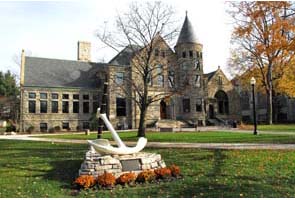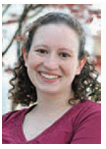
Hope College in Holland, Michigan
Postdocs Sunshine Silver and Erin Iski
recently attend a workshop entitled “Postdoc to Primarily Undergraduate Institution (PUI) Professor” at Hope College in Holland, Michigan. The workshop was geared to preparing postdocs for navigating the application and interviewing process for academic positions at PUIs. Many faculty positions are available at two year, non-Ph.D. granting colleges. The workshop was to provide information to postdocs on seeking out these colleges for rewarding, pedagogical careers.
The format of the workshop consisted of a series of panels comprised of faculty members from different academic institutions with heavy representation from Hope College. Information in the panels covered the entire process of becoming a professor and survival tips for making the transition. Areas that were addressed included information on the initial application process and materials, interviewing, negotiating, accepting offers, how to survive the first year(s) and preparing for tenure success as well as realizing a work-life balance in the process.
“I learned of this workshop — accidentally — through a post on Linked-In,” says Sunshine Silver, “I applied because I had started the application process for academic positions, but did not have a clear direction for navigating the process.”
Silver found the workshop also provided a critique of each participant’s teaching philosophy and research statements, by a professor of the respective sub-discipline. Most academic institutions require these two documents as part of the application process. Silver found this part of the workshop most attractive.
Erin Iski decided to attend because, “I knew that I wanted to go into academia and was searching for some guidance on the best way to go about that.” Iski had applied to about 15 schools with moderate success of landing on campus interviews. “I learned from the workshop that everyone spends their first year just trying to keep their head above water,” says Iski. “It is perfectly normal to feel completely overwhelmed.” Iski learned not to take on too much during the first year of a faculty position such as starting a brand new course. “You will have your hands full with teaching for the first time as it is,” advises Iski.
Obtaining an academic position is all about finding the right fit — for the applicant as a potential faculty member and for the department or institution looking for someone to teach specific classes. The department needs someone to fill a specific role with the correct background and experience to teach certain courses, but they also want someone who is going to be excited to teach those classes at their institution and be able to support the institution’s mission.
“As a participant,” says Silver, “I was able to learn more about the different types of institutions such as community colleges, PUIs, small liberal arts schools and state schools, and research institutions. This helped me discern what type of institution I would personally find the best fit.”
Silver and Iski learned that as potential candidates one’s application materials can be set aside if it seems the candidate is stretching to fit the position. Tailoring one’s application along with the submitted materials for the position goes a long way. However, participants at the workshop also learned not to limit themselves to one exact “flavor” of science. Showing the ability to be flexible and fit multiple areas helps as well.
“When preparing for an initial interview, be prepared for difficult questions,” says Silver, “make sure you have practiced.” Both women learned that if selected for an on campus interview, the institution already views you as a stellar candidate. Preparation is necessary to showcase one’s skills. Applicants should ensure their teaching philosophy, research statements and teaching lesson demonstrate the talents and expertise they possess. In the end departments are seeking out a colleague, so be collegial throughout the process even though it can be strenuous and trying at times.
“Reach out to your colleagues and the resources available to you,” advises Silver. She found her coworkers were happy to listen to her sample teaching lesson and provided helpful guidance. “After attending the workshop, I left with a better sense of what a department and administration would be looking for in a faculty member, this helped boost my confidence,” says Silver. Silver recently accepted a position as an assistant professor in Natural Sciences at Concordia University. She felt the workshop helped her prepare for this position. She also recently visited her former undergraduate institution to give a research seminar. The experience in lecturing to her former professors helped her hone her presentation skills for the interview.
The workshop also provided information in applying for grants, covered new web-based programs available for researchers and was an excellent opportunity for networking. Iski personally met many different researchers who were in her position. This made her feel that she was not alone in her search for an academic position. “Seek out these types of workshops if you are thinking of going into academia,” recommends Iski. The workshops are many times completely paid for, including travel costs, meals and lodging. Iski also advises fellow postdocs to prepare by getting an early start on application materials. “Do not hesitate to ask friends and colleagues to edit them for you,” says Iski.
 Erin Iski is a postdoc in the Nanoscience and Nanotechnology Division. She has been at the laboratory for almost two years. Her current research focus is on surface chemistry of organic molecules on metal surfaces using ultra-high vacuum scanning tunneling microscopy. She received her bachelors of science in Chemistry from the University of Tulsa in 2005 and her Ph.D. from Tufts University in 2011.
Erin Iski is a postdoc in the Nanoscience and Nanotechnology Division. She has been at the laboratory for almost two years. Her current research focus is on surface chemistry of organic molecules on metal surfaces using ultra-high vacuum scanning tunneling microscopy. She received her bachelors of science in Chemistry from the University of Tulsa in 2005 and her Ph.D. from Tufts University in 2011.
 Sunshine Silver is a postdoc in the Chemical Science and Engineering Division at Argonne. She is part of the Solar Energy Conversion Group and has been with the laboratory for two and a half years. Her research focus is in bioinorganic chemistry. She received her bachelors of science in Chemistry from St. Cloud State University in Minnesota in 2005 and her Ph.D. in Biochemistry from Montana State University in 2010.
Sunshine Silver is a postdoc in the Chemical Science and Engineering Division at Argonne. She is part of the Solar Energy Conversion Group and has been with the laboratory for two and a half years. Her research focus is in bioinorganic chemistry. She received her bachelors of science in Chemistry from St. Cloud State University in Minnesota in 2005 and her Ph.D. in Biochemistry from Montana State University in 2010.

